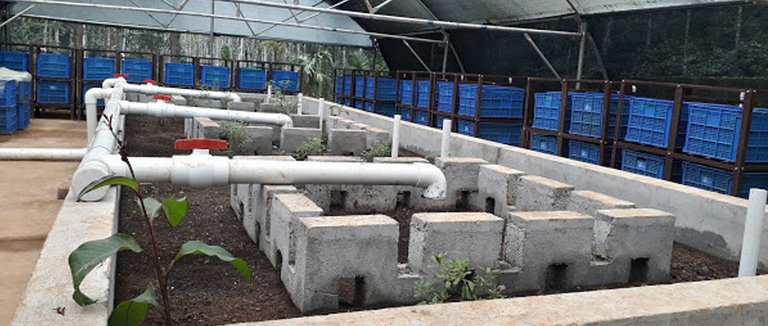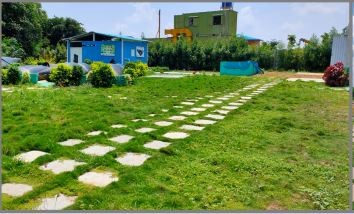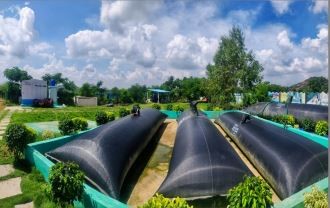Catalyzing Private Sector Participation for Faecal Sludge and Septage Management (FSSM) in India

The Challenge:
In India, as per the 2011 Census, 81.4% of urban households had access to toilet facilities of which 32.7% were connected to sewer systems and 38.2% to septic tank or Onsite Sanitation Systems (OSS).
With the launch of Swachh Bharat Mission (SBM-U) and its impetus towards making the nation open defecation free, it has led to increase in toilet coverage to 100% with the construction of about 61 lakh individual household toilets and 5.82lakh Community/Public Toilets facilities in urban areas .

However, around 60 % of urban households are still dependent on OSS and the remaining 40% are serviced with the sewerage system. Though government targets to cover the 60% households with sewerage facilities under AMRUT by 2022 , but it seems a long drawn process. Moreover, it is not practically possible to connect every household to the sewerage system. Hence, to achieve a sustainable sanitation ecosystem and manage the OSS there is a need for effective evacuation, transportation, and treatment of waste (faecal sludge and septage) along with reuse or responsible disposal of the treated product.
It is estimated that the required capacity for faecal sludge treatment will rise to 61 Million Litres per Day by 2024 . At least 2000 Faecal Sludge Treatment Plants (FSTPs) will be needed to meet this demand along with investment required to the tune of INR ~6000 Crore over the next 5 years .

While there has been a concentrated effort from the government, involving the private sector can provide a huge impetus in addressing the demand-supply gap in Faecal Sludge and Septage Management space (FSSM).
Need for Private Sector:
In order to service the demand for faecal sludge treatment, it is critical to catalyze and scale participation of private sector players in the FSSM value chain. Engagement of the private sector is expected to lead to reduced burden for ULB staff, provision of technical expertise, higher service levels, fast track implementation as well as increased innovation.
Models for Private Sector Engagement:
The FSSM value chain provides multiple modalities for the private sector to capitalize the huge potential. Urban local bodies (ULBs) outsource the value chain activities partially or completely to the private sector. Private players can be involved in emptying of faecal sludge from households and transporting it to the FSTPs. They can take up construction and operations of these FSTPs as well. Some ULBs also allow private players to integrate both conveyance as well as treatment related activities.
One such public private partnership (PPP) model launched by the state of Andhra Pradesh for FSTP construction and operations is the Hybrid Annuity Model (HAM) on a Design, Build, Operate and Transfer (DBOT) basis. Under this model, private player undertakes construction, operation and maintenance of a cluster of FSTPs for a period of 10 years. Swachha Andhra Corporation (SAC) monitors construction, operations & maintenance and performance of these FSTPs. Even as 50% of the capital investment comes from the private player, the remaining 50% is paid by the government to the player in form of annuity payments along with fixed O&M cost.
FSTP Showcase:
Banka Bioloo Ltd. is one such player operating a cluster of FSTPs under the HAM model in Andhra Pradesh. One of the FSTPs is in Rajam, with a capacity of 15 KLD. The company uses geotube based dewatering technology to separate bio-solids and water.

The water produced is treated by a combination of treatment regimes and is rendered fit for recycle; while the separated bio-solids are self-composted, assured of nutritional and safety levels and dispatched as soil conditioner. The plant has very little electro mechanical dependency, is energy efficient and thus is very easy to scale.

Considerations for Catalyzing Private Sector Participation:
In order to develop a cohesive ecosystem to encourage sustained participation of private sector, there is a need to focus on multiple components such as
• Showcasing the market opportunity to potential players from allied sectors such as solid waste management, liquid waste management etc.
• Alternate revenue models for FSTP operators
• Access to low cost debt
• Skill upgradation for the consultant pool to be able to design Detailed Project Reports (DPRs) for FSTPs and supervise construction and operations of FSTPs
• Balanced risk sharing mechanisms in the agreement between State/City level bidding authority and the concessionaire
• Assurance of timely payments made by the bidding authority
Intellecap & FSSM:

Intellecap is working towards building an enabling ecosystem for catalyzing private sector participation in the construction and operations of FSTPs. Some of our initiatives include:
Outcomes:
• Increased participation of private sector players bidding for FSTP tenders in 5 states
• Enabling collaboration among players by way of JV formation for bidding purposes
• Innovative financing mechanisms for FSTP operators
• Capacity building of financial institutions for FSSM lending
• Creation of pool of 20 FSSM consultants to serve as ready reference for the ecosystem
• Design of FSSM specific training curriculum for consultants




